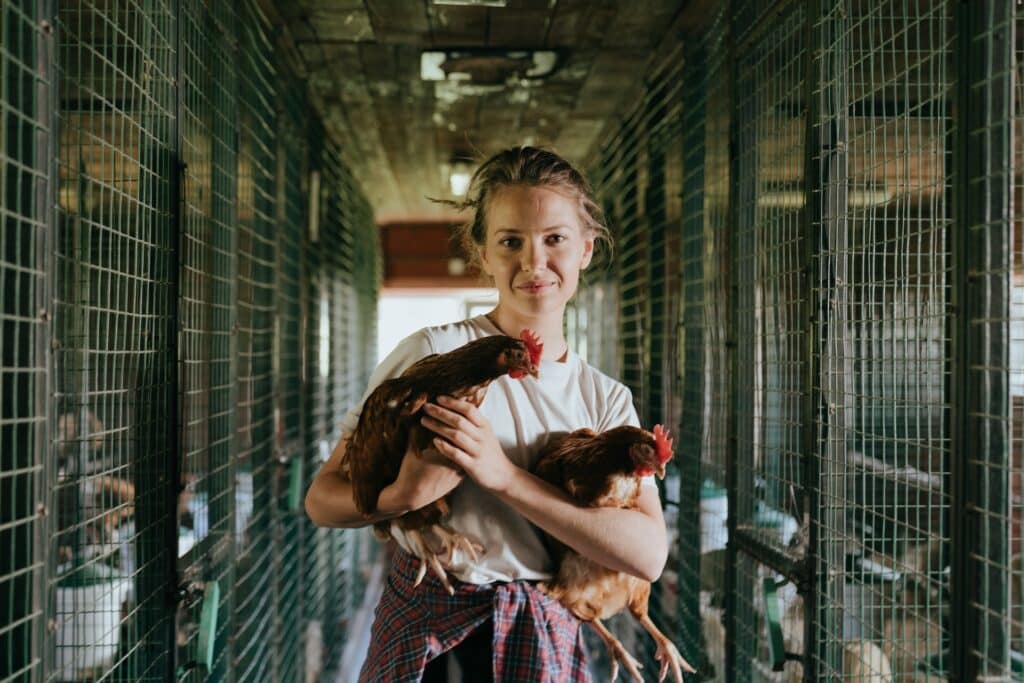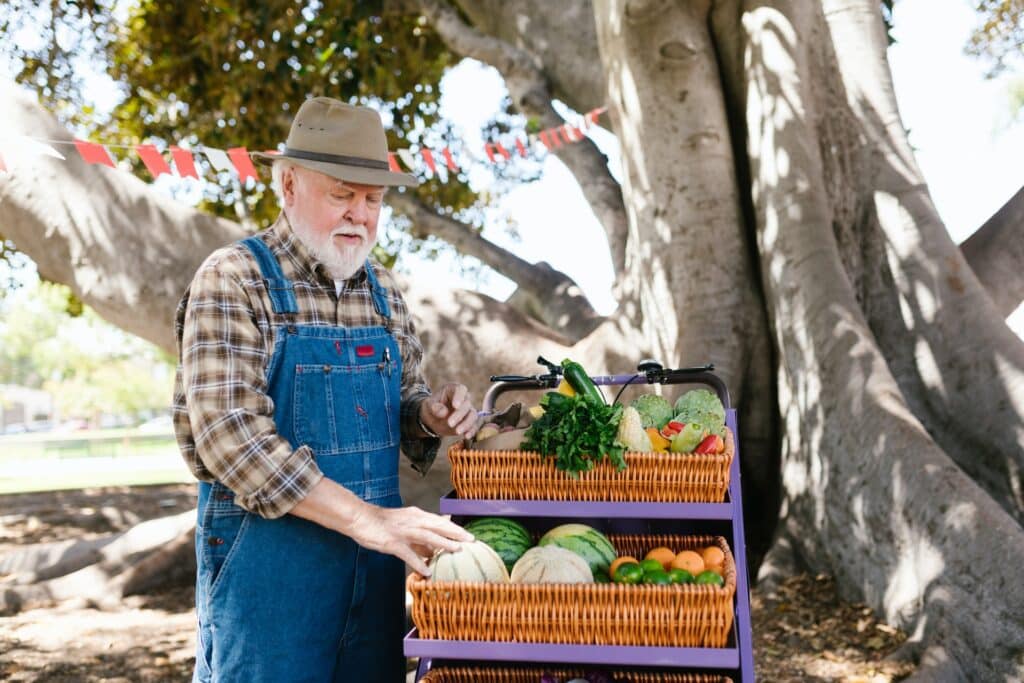The role of a farmer is not merely that of a cultivator; it’s the backbone of sustenance and progress for any agricultural enterprise. From tilling the land to nurturing crops, their hands-on involvement directly influences the growth of the company.
As a cornerstone of the farming community, a farmer’s significance cannot be overstated. To ensure the prosperity of your agricultural venture, it’s imperative to select the right farmers with the right set of skills. In this blog, we delve into the intricacies of hiring a farmer, exploring the essential hard and soft skills that make a farmer excel.
We’ll uncover strategies for assessing these skills during the hiring process and provide insights into crafting a compelling farmer job description. Furthermore, we’ll discuss the avenues available for finding the best-fit candidates and offer guidance on estimating the costs associated with hiring skilled farmers. Join us on this journey to discover the keys to selecting farming talent that can cultivate success from the ground up.
What is the role of a farmer?
At the heart of every bountiful harvest and thriving agricultural operation stands the figure of a farmer. A farmer is much more than someone who plants seeds and reaps crops – they are stewards of the land, orchestrators of nature’s rhythm, and architects of sustenance. Their role encompasses a diverse array of responsibilities, each contributing significantly to the growth of the company and the sustenance of communities.
Roles and responsibilities:
A farmer’s role extends beyond the confines of a mere job title. It involves:
Cultivation and Harvesting: Farmers prepare the soil, plant seeds, and nurture crops through various growth stages. They’re adept at employing sustainable practices to maximize yield and quality.
Livestock Care: For those engaged in animal husbandry, farmers are responsible for tending to the health and well-being of livestock, ensuring optimal conditions for growth and productivity.
Equipment Operation: Operating and maintaining farming machinery and equipment is a vital aspect of a farmer’s daily tasks.
Problem Solving: Farmers are adept at diagnosing and addressing issues like pests, diseases, and adverse weather conditions to safeguard crop health and output.
Market Awareness: They stay attuned to market trends, adjusting their planting and harvesting strategies accordingly to meet demand and optimize profitability.
Contribution to company’s growth:
A farmer’s impact on a company’s growth is profound. By diligently executing their tasks, they directly influence crop quality and yield, which in turn affects sales revenue and market reputation. A farmer’s efficient resource management, sustainable practices, and innovation lead to cost reduction and increased profitability. Their commitment to quality nourishes customer trust and loyalty, bolstering the company’s long-term success.
In the agricultural symphony, the farmer’s role is that of a skilled conductor, orchestrating nature’s harmony to bring forth abundance and prosperity.
Hard skills to assess in a farmer
Selecting a skilled farmer involves more than just a green thumb; it requires a discerning eye for key hard skills that form the foundation of agricultural success. When evaluating candidates for a farmer position, consider the following essential hard skills:
1. Crop Management Expertise: An adept farmer should showcase a deep understanding of crop lifecycles, planting techniques, and harvesting procedures. Assess their knowledge of soil types, irrigation methods, and fertilization practices, as well as their ability to select appropriate crops for the local climate.
2. Machinery Proficiency: Farm operations often rely on heavy machinery. Evaluate a candidate’s competence in operating tractors, plows, irrigation systems, and other relevant equipment. Their familiarity with maintenance and troubleshooting is equally crucial.
3. Pest and Disease Management: Effective pest and disease control is paramount to preserving crop health. Inquire about a candidate’s experience with identifying, preventing, and mitigating these challenges without excessive reliance on chemicals.
4. Soil Health Assessment: Farmers should possess the ability to assess soil quality and implement strategies to enhance it. Look for candidates who understand soil testing, nutrient balancing, and erosion prevention techniques.
5. Data-Driven Decision Making: Modern farming increasingly incorporates technology. Seek candidates comfortable with using data analytics for yield prediction, resource optimization, and adapting strategies based on real-time insights.
6. Sustainability Practices: Given the focus on eco-conscious farming, candidates should demonstrate knowledge of sustainable practices like crop rotation, cover cropping, and water conservation methods.
Assessment strategies:
Scenario-Based Questions: Present hypothetical situations and ask candidates how they would address challenges related to crop management, machinery breakdowns, or pest outbreaks.
Technical Tests: Create practical tests that assess their ability to operate machinery or perform tasks like soil testing accurately.
Portfolio Review: Request examples of their past work, such as successful crop yield records or instances where they effectively tackled pest infestations.
Problem-Solving Exercises: Gauge their critical thinking by giving them a real-life issue to troubleshoot or optimize within a farming context.
Certifications and Training: Inquire about any certifications or specialized training they have undergone, indicating their commitment to continuous learning.
In the intricate dance of farming, a candidate’s hard skills set the rhythm for productivity and prosperity. By scrutinizing these skills during the hiring process, you lay the groundwork for a farmer who can cultivate success from seed to harvest.
Soft skills to assess in a farmer
While hard skills form the technical backbone of farming, it’s the soft skills that infuse character into a farmer’s role, shaping their ability to navigate challenges, collaborate effectively, and adapt to ever-changing agricultural landscapes. As you evaluate candidates for a farmer position, consider the following essential soft skills:
1. Adaptability and Resilience: Farming is subject to weather fluctuations, market shifts, and unforeseen challenges. Look for candidates who can thrive in unpredictable situations, adjust strategies, and persevere through adversity.
2. Communication and Teamwork: Farming often involves collaboration with diverse teams – from laborers to agronomists. Assess a candidate’s ability to communicate clearly, share insights, and collaborate harmoniously to achieve common goals.
3. Problem-Solving Aptitude: The ability to identify issues on the farm and devise creative solutions is invaluable. Evaluate a candidate’s capacity to think on their feet and implement effective problem-solving strategies.
4. Time Management and Organization: Farmers juggle multiple tasks simultaneously. Seek candidates who exhibit strong organizational skills, prioritize efficiently, and manage time effectively to optimize productivity.
5. Leadership and Decision Making: In larger farm operations, leadership skills are vital. Assess a candidate’s aptitude for taking charge, delegating tasks, and making informed decisions that benefit the team and the enterprise.
6. Patience and Attention to Detail: From seedling to harvest, patience and attention to detail can mean the difference between success and failure. Look for candidates who exhibit meticulousness in tasks like planting, pruning, and quality control.
Assessment strategies:
Behavioral Interviews: Pose situational questions that require candidates to describe instances where their adaptability, communication, or problem-solving skills were put to the test.
Role-Play Exercises: Assign candidates scenarios that demand collaboration and decision-making within a team setting.
Reference Checks: Speak with former colleagues or supervisors to gain insights into a candidate’s teamwork, leadership, and adaptability qualities.
Group Activities: Include group activities during the interview process to observe how candidates interact and communicate with peers.
Storytelling: Encourage candidates to share anecdotes from their farming experiences that highlight their ability to manage challenges, lead others, and maintain attention to detail.
Cultural Fit Assessment: Evaluate how well a candidate’s values and working style align with the organization’s culture, as this can impact their ability to collaborate and adapt effectively.
In the delicate tapestry of agriculture, it’s the soft skills that embroider resilience, collaboration, and ingenuity into the fabric of a farmer’s role. By carefully assessing these attributes, you secure a farmer who not only cultivates crops but also nurtures success.

How to test a farmer’s skills
Evaluating a farmer’s skills goes beyond the traditional interview process. Practical tests provide tangible insights into a candidate’s abilities and decision-making under real farming scenarios. Here are some technical tests that can effectively assess a farmer’s skills:
1. Crop Management Simulation: Create a controlled simulation where candidates demonstrate their crop management skills. This can involve planting, irrigation, pest control, and harvesting tasks. Observing their hands-on approach offers valuable insights into their competence.
2. Machinery Operation Proficiency: Administer a test that assesses a candidate’s ability to operate farming machinery safely and efficiently. This could include tractor driving, plowing, or operating irrigation systems. A skilled farmer should handle equipment confidently.
3. Soil Analysis and Treatment: Provide candidates with soil samples to analyze. Ask them to interpret the results and recommend appropriate treatments to improve soil quality and nutrient balance. This reveals their knowledge of soil health management.
4. Pest and Disease Management Scenario: Present a hypothetical pest or disease outbreak scenario. Have candidates outline a comprehensive strategy to identify, control, and prevent further spread. This gauges their practical understanding of integrated pest management.
5. Data-Driven Decision Challenge: Give candidates historical yield and weather data. Ask them to make informed decisions on crop rotation, planting schedules, and irrigation frequency. This evaluates their ability to leverage data for optimal decision-making.
Importance of technical tests:
Demonstrated Competence: Technical tests offer direct evidence of a candidate’s abilities in real-world farming tasks. This ensures they possess the necessary practical skills for the role.
Predictive Performance: By observing a candidate’s performance in simulated scenarios, you gain insights into how they would handle similar situations on the job, minimizing the risk of mis-hires.
Objective Evaluation: Technical tests provide an objective basis for comparing candidates’ skills. This ensures fair and unbiased assessment, promoting accurate selection.
Alignment with Job Demands: Farming requires hands-on expertise. Practical tests bridge the gap between theoretical knowledge and actual execution, ensuring candidates can meet the demands of the role.
Cost-Effective Hiring: While technical tests require effort to set up, they prove cost-effective in the long run by preventing hiring mistakes and reducing turnover.
Enhanced Training Focus: Insight from technical tests can guide targeted training for new hires, ensuring they quickly integrate into the existing farm operation.
By incorporating practical technical tests into your hiring process, you go beyond assumptions and witness firsthand a candidate’s ability to nurture the land and cultivate success, ensuring your farming venture thrives with capable hands at the helm.
Where to find the best farmer
Discovering the ideal farmers to propel your agricultural venture forward requires strategic outreach across various platforms. Here’s how to effectively locate and leverage the best-suited candidates for the role:
1. Agriculture Job Boards: Dedicated agriculture job boards and websites are treasure troves of farming talent. Platforms like AgHires, AgCareers, and Farmers Weekly Jobs specialize in connecting farmers with opportunities tailored to their expertise.
2. Local Agricultural Institutions: Engage with local agricultural colleges, universities, and vocational schools. These institutions often have career centers and job fairs where you can connect with aspiring farmers looking for real-world opportunities.
3. Social Media Networks: Leverage the power of social media platforms like LinkedIn, Facebook groups, and Twitter to tap into farming communities and networks. Sharing job postings, engaging with farming forums, and reaching out directly can yield fruitful results.
4. Farming Associations and Events: Participate in farming association meetings, seminars, and trade shows. These events bring together industry professionals and enthusiasts, providing an excellent platform to meet potential candidates.
5. Agricultural Publications: Advertise in agricultural magazines, newspapers, and online publications. Many farmers rely on these sources for industry updates and job listings.
6. Networking Within Agricultural Communities: Reach out to your existing network of farmers, suppliers, and consultants. Word-of-mouth recommendations from trusted sources often yield exceptional candidates who align well with your farm’s ethos.
7. Local Community Channels: Utilize local community boards, bulletin boards, and even radio advertisements to attract farmers from the nearby region who are already familiar with local farming conditions.
8. Online Job Portals: General job portals like Indeed and Monster can also be valuable. Tailor your job description to emphasize the farming-specific requirements to attract relevant candidates.
By strategically navigating these platforms, you extend your reach to potential farmers who are not only skilled but also share a passion for agriculture. This comprehensive approach maximizes your chances of finding the best-suited candidates to cultivate growth and prosperity within your farming enterprise.
Farmer job description template
Job Title: Farmer
About Us: [Company Name] is a [describe your company’s mission, values, and focus in agriculture, e.g., sustainable farming practices, organic produce, community involvement]. We are dedicated to cultivating high-quality crops while preserving the environment and fostering growth in our local community.
Responsibilities:
- Manage crop cultivation from planting to harvesting, including soil preparation, planting, irrigation, pest control, and harvesting.
- Operate and maintain farming machinery and equipment, ensuring optimal performance and safety.
- Implement sustainable farming practices such as crop rotation, cover cropping, and soil conservation.
- Monitor and address issues related to pests, diseases, and adverse weather conditions.
- Collaborate with the team to plan planting schedules, crop rotations, and resource allocation.
- Keep accurate records of farming activities, yields, and expenses for reporting purposes.
- Stay informed about industry trends, market demands, and emerging technologies to enhance productivity.
Qualifications:
- Proven experience as a farmer or in a related agricultural role.
- Strong knowledge of crop lifecycles, soil management, and pest control techniques.
- Proficiency in operating farming machinery and equipment.
- Excellent problem-solving skills and the ability to adapt to changing conditions.
- Effective communication and teamwork abilities.
- Attention to detail and a commitment to quality.
- Relevant certifications or education in agriculture (optional but preferred).
Why join us?
- Opportunity to work in a dynamic and innovative farming environment.
- Contribute to sustainable and ethical agricultural practices.
- Collaborative team focused on growth and success.
- Engage with a supportive community of fellow farmers and industry experts.
Benefits:
- Competitive salary based on experience.
- Health and wellness benefits package.
- Opportunities for professional development and training.
- Access to fresh produce and agricultural products.
- [Include any other benefits specific to your company].
Application Process: To apply, please submit your resume and a cover letter outlining your relevant experience and passion for farming. We look forward to reviewing your application and discussing how you can contribute to our team.
[Include any other important information about the application process, such as deadlines or contact details].
You can customize this job description template to match your company’s specific needs, values, and requirements.
How much does a farmer cost?
The cost of hiring a farmer in the US varies based on experience and skills. On average, entry-level farmers earn around $30,000 to $40,000 per year. Mid-career farmers with 5-10 years of experience can expect to earn between $40,000 and $60,000 annually. Highly skilled farmers with over 10 years of experience, specialized certifications, or managerial roles can command salaries ranging from $60,000 to $100,000 or more. These figures may vary based on the size of the farm, location, and specific responsibilities.

Farmer interview questions
Interviewing candidates for a farmer role requires a balanced approach to assess their technical expertise, soft skills, and overall fit within your agricultural operation. Here are top 15 interview questions categorized as per their relevance:
Hard skills:
- Can you describe your experience with crop rotation and its benefits for soil health and yield optimization?
- What methods do you employ to prevent and manage pests and diseases while minimizing chemical use?
- Share your knowledge of irrigation techniques and how you adjust irrigation schedules based on weather conditions.
Soft skills:
- Tell us about a time when you had to adapt your farming strategy due to unexpected weather challenges. How did you handle it?
- Describe a situation where you had to collaborate with other team members to achieve a common farming goal. How did you ensure effective communication and teamwork?
- Can you provide an example of how you troubleshoot and solve problems when facing unexpected challenges on the farm?
General skills:
- Explain your experience in operating various farming machinery and equipment. How do you ensure safety during operations?
- How do you stay updated on the latest agricultural trends, technologies, and best practices?
- Share an instance where you had to make a critical decision that impacted the farm’s productivity and profitability. How did you approach it?
Cultural fit:
- What attracted you to our farm and our farming practices? How do they align with your values and career aspirations?
- How do you incorporate sustainable farming practices into your work?
- Can you share a story that highlights your dedication to attention to detail in farming tasks, such as planting, nurturing, or harvesting?
Long-term vision:
- Where do you see the future of agriculture heading, and how do you intend to contribute to its growth and sustainability?
- How do you envision your role evolving within our farm operation in the next few years?
- What innovative farming methods or techniques have you recently learned or experimented with? How do you think they could benefit our farm?
Asking these questions provides insight into a candidate’s practical skills, their ability to collaborate and adapt, their alignment with your farm’s values, and their potential for growth within your operation.
Assess for farmer skills to avoid mis-hires
The journey to finding the perfect farmer for your agricultural enterprise is dotted with challenges. The wrong hire can lead to setbacks in productivity, resource wastage, and compromised crop quality. Implementing thorough farmer assessment is an essential strategy to mitigate these risks.
Reduced Time to Hire: By incorporating tailored assessments into your hiring process, you expedite the identification of candidates who possess the necessary hard skills, soft skills, and cultural fit for your farm. This targeted approach streamlines the selection process, saving time for both you and the applicants.
Enhanced Skill Evaluation: Assessments enable a deeper dive into a candidate’s practical abilities, providing a clearer picture of their potential contributions. You can witness firsthand their problem-solving, machinery operation, and decision-making skills, ensuring alignment with your farm’s demands.
Discover a streamlined approach to hiring the right farmers with Testlify, a cutting-edge talent assessment tool. Our platform offers customizable assessments tailored to farming roles, helping you identify top candidates quickly and effectively. Schedule a free 30-minute live demo today for a demo and witness how Testlify can transform your hiring process for agricultural success.








